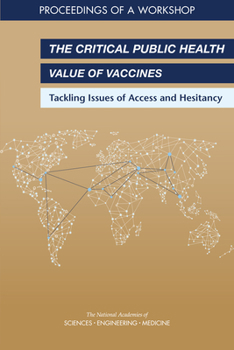The Critical Public Health Value of Vaccines: Tackling Issues of Access and Hesitancy: Proceedings of a Workshop
Immunization against disease is among the most successful global health efforts of the modern era, and substantial gains in vaccination coverage rates have been achieved worldwide. However, that progress has stagnated in recent years, leaving an estimated 20 million children worldwide either undervaccinated or completely unvaccinated. The determinants of vaccination uptake are complex, mutable, and context specific. A primary driver is vaccine hesitancy - defined as a delay in acceptance or refusal of vaccines despite availability of vaccination services. The majority of vaccine-hesitant people fall somewhere on a spectrum from vaccine acceptance to vaccine denial. Vaccine uptake is also hampered by socioeconomic or structural barriers to access.
On August 17-20, 2020, the Forum on Microbial Threats at the National Academies of Sciences, Engineering, and Medicine held a 4-day virtual workshop titled The Critical Public Health Value of Vaccines: Tackling Issues of Access and Hesitancy. The workshop focused on two main areas (vaccine access and vaccine confidence) and gave particular consideration to health systems, research opportunities, communication strategies, and policies that could be considered to address access, perception, attitudes, and behaviors toward vaccination. This publication summarizes the presentations and discussion of the workshop.





